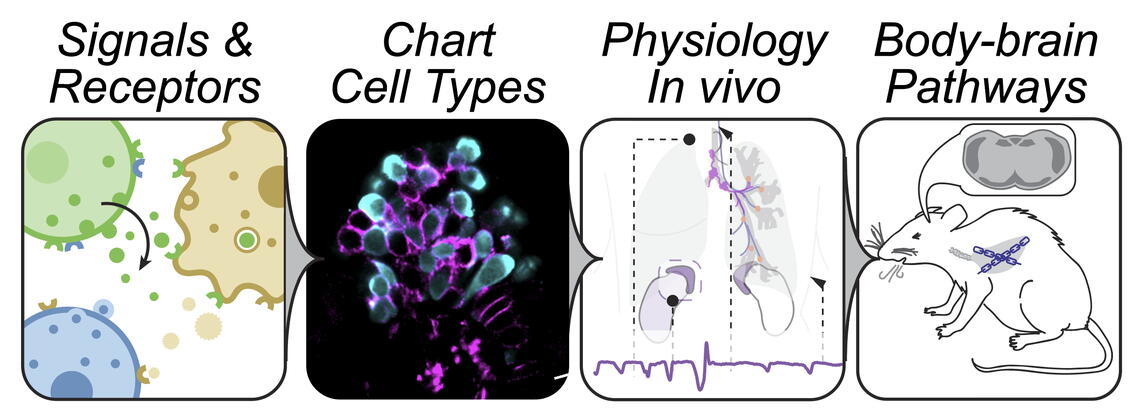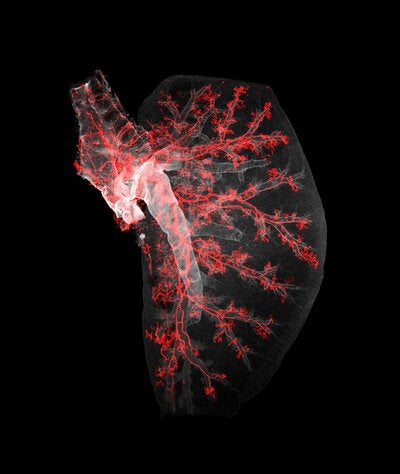
The School of Molecular & Cellular Biology and Department of Molecular & Integrative Physiology are pleased to welcome new faculty member Dr. Michael Schappe. He joins the school as an assistant professor in January 2026. His research lies in the areas of Neuroscience and Neurologic disorders, Immunology and Inflammation, Membrane and Ion Channel Biology, Pharmacology and Small Molecule Discovery, and Signal Transduction and Cell-to-Cell Communication.
Tell us about your lab and your research focus, including how you came to choose or specialize in this area.
Whether running a marathon or getting over a cold, the nervous system constantly helps our physiology and behavior adapt to our bodily needs. I am interested in understanding the molecular mechanisms enabling body-brain pathways to sense and adapt physiology. Our biology relies on specific receptors, cells, and neural circuits to protect the body and ensure resilient organ function during homeostatic and pathological challenges, such as changing environments or collateral damage of inflammation. I first studied how inflammatory signaling pathways are shaped by ion channels in immune cells, which tune processes like cytokine production and phagocytosis. This inspired me to then understand how these systems scale from a cellular level to entire organ systems and eventually, shape our internal sensations. Our research ultimately seeks to understand the molecular logic of physiological circuits underlying body-brain communication.
Thus far, our research revealed how the body senses airway function and difficulty breathing through specific neurons from the vagus nerve. Vagal sensory neurons project to nearly all of our visceral organs, detecting dynamic chemical and mechanical information to relay it directly to the brain, evoking internal sensations and reflexes like gasps or cough.

We use genetic tools to identify key receptors and cell types that control the sensations and neuronal reflexes that safeguard breathing, including approaches to active and ablate key cell types, chart neuroanatomy, and record single-cell response properties. In the lungs, we defined specific neurons that sense “lung deflation,” stimuli that activate them (airway closure and inhaled irritants), and gasping reflexes they control to re-open closed airways. Unexpectedly, we found these neurons rely on rare, mysterious sentinel cells in the lung called neuroepithelial bodies (NEBs) that act as mechanosensors to sense airway closure and relay this signal to the brain to evoke distressed breathing. Other airway senses and body-brain pathways remain poorly-understood.

Identifying receptors and neurons that mediate basic sensations like taste, touch, and hunger were fundamental advances in neurobiology. We are excited to continue exploring this new frontier, and these insights could one day help treat cardiopulmonary disorders, asthma, and other conditions linked to body-brain physiology.
What is especially exciting about this particular area of research, at this time?
The field of interoception, or body-brain neurobiology, is now poised for major breakthroughs. New tools are allowing us to investigate fundamental mysteries behind our internal sensations, and so far, illuminated exciting new discoveries and questions. This includes new genetic and imaging tools that allow us to watch and control the functions internal organs and cells in real time. The body and brain work together, and revealing the relevant molecules, cells, and circuits behind this communication will enable advances that allow us to answer significant biological questions and enable mechanistic studies necessary to design new therapies.
What interested you the most about becoming a faculty member in the School of MCB and at Illinois?
I always enjoyed science most when surrounded by people and ideas from many different backgrounds. The outstanding faculty, staff, and students I came to know in MCB, coupled with the phenomenal expertise across fields the University of Illinois, felt like a natural fit for me. I was thrilled for the opportunity to learn from and contribute to the outstanding environment for research, collaboration, and education at Illinois!
What are your teaching interests?
Understanding how the body and brain work together is an exciting and emerging field in the biomedical sciences. This creates new challenges and opportunities for teachers and learners to make (and discover) new connections between once-distinct subjects. From the level of molecules to bodily systems, I am excited to teach about how our organs communicate with each other and the brain listens to the body. What does the ‘extreme physiology’ of mountain climbing or spaceflight teach us about how the heart and lungs communicate? Why do the genes and receptors behind our sense of touch help us understand feeling breathlessness? How do interactions between the nervous and immune systems control allergies, ‘stressful hives,’ or achy joints? My goal is to help students connect molecular and systems-level concepts. Whether in the laboratory or classroom, I aim to create inclusive learning environments that inspire curiosity, critical thinking, and independence.
My philosophy is grounded in preparing learners to become adaptable scientists who critically analyze biomedical problems, design and execute experiments, and effectively communicate their findings and outstanding questions. At the same time, I strive to inspire, train, and empower learners in communities where everyone’s voice and perspective are valued. My goal is to provide learners with the tools they need to succeed and help shape the next generation of scientists.
If any students (undergrad or grad) are interested in working in your lab, what’s your advice or how can they get in touch with you?
You can always learn more about our ongoing research opportunities by visiting the departmental webpage or our laboratory website. We are looking for scientifically curious and motivated lab members who enjoy hands-on discovery. If you are excited to learn more, please feel free to email me (mschappe@illinois)!
Tell us about someone who made a difference in your life, such as someone who sparked your interest in biology, who encouraged you to pursue a career in academia or challenged your thinking about a topic.
My graduate advisor helped me realize the exciting scientific spark that can come from experimental discoveries, being fearless to try new techniques and ideas, and the excitement from pursing big questions. This inspired me to explore across fields and eventually study body-brain communication. Their mentorship continues to inspire how I encourage my own trainees to take creative risks and pursue ambitious biological questions.
What do you like to do in your free time?
Outside the lab, I get excited to experiment in cooking, and traveling has been the most fun way for me to experience new foods. Recently, I have been trying to recreate my favorite movie props (and anatomical models) with 3D printing. Although playing squash and baseball remain some of my favorite pastimes, I have been more successful watching football and Formula 1 on the weekends.
